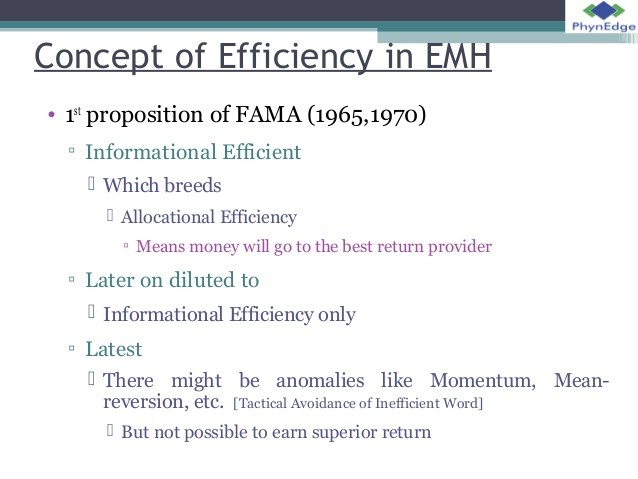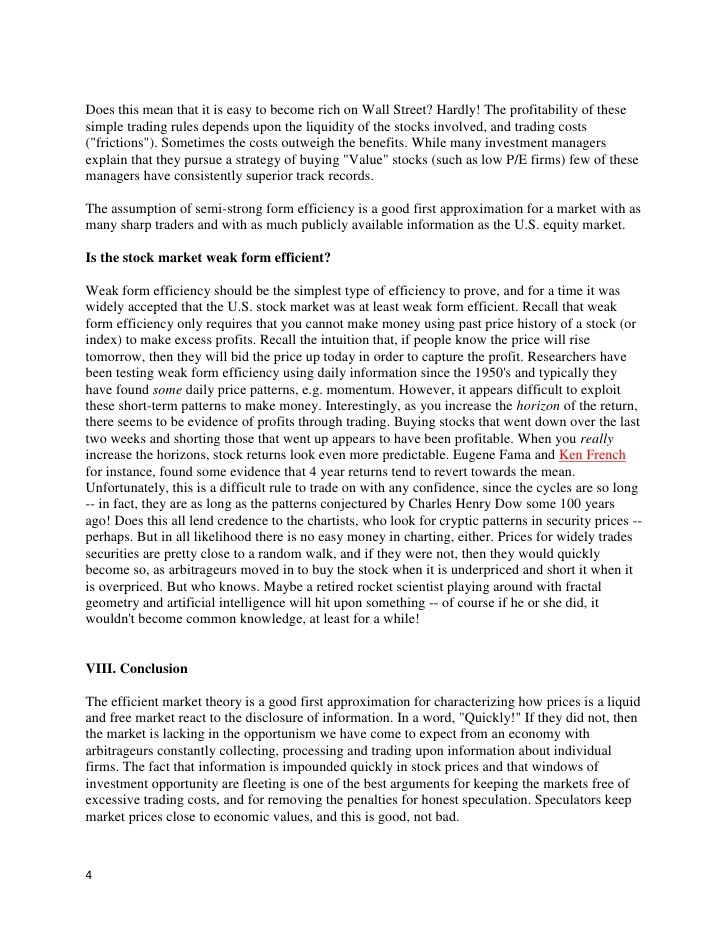Efficient market hypothesis_4
Post on: 7 Май, 2015 No Comment

Weak-form efficiency
- No excess returns can be earned by using investment strategies based on historical share prices or other financial data.
- Weak-form efficiency implies that Technical analysis will not be able to produce excess returns.
- To test for weak-form efficiency it is sufficient to use statistical investigations on time series data of prices. In a weak-form efficient market current share prices are the best, unbiased, estimate of the value of the security. The only factor that affects these prices is the introduction of previously unknown news. News is generally assumed to occur randomly, so share price changes must also therefore be random.
Semi-strong form efficiency
- Share prices adjust instantaneously and in an unbiased fashion to publicly available new information, so that no excess returns can be earned by trading on that information.
- Semi-strong-form efficiency implies that Fundamental analysis will not be able to produce excess returns.
- To test for semi-strong-form efficiency, the adjustments to previously unknown news must be of a reasonable size and must be instantaneous. To test for this, consistent upward or downward adjustments after the initial change must be looked for. If there are any such adjustments it would suggest that investors had interpreted the information in a biased fashion and hence in an inefficient way.

Strong-form efficiency
- Share prices reflect all information and no one can earn excess returns.
- To test for strong form efficiency, a market needs to exist where investors cannot consistently earn excess returns over a long period of time. When the topic of insider trading is introduced, where an investor trades on information that is not yet publicly available, the idea of a strong-form efficient market seems impossible. Studies on the US stock market have shown that people do trade on inside information. It was also found though that others monitored the activity of those with inside information and in turn followed, having the effect of reducing any profits that could be made.
- If there are fund managers who have consistently beaten the market, then it cannot be described as being strong-form efficient. Common sense and empirical evidence suggest that stock markets are unlikely to be strong-form efficient.
Arguments concerning the validity of the hypothesis
Many observers dispute the assumption that market participants are rational, or that markets behave consistently with the efficient market hypothesis, especially in its stronger forms. Many economists, mathematicians and market practitioners cannot believe that man-made markets are strong-form efficient when there are prima facie reasons for inefficiency including the slow diffusion of information, the relatively great power of some market participants (e.g. financial institutions), and the existence of apparently sophisticated professional investors.
The efficient market hypothesis was introduced in the late 1960s and the prevailing view prior to that time was that markets were inefficient. Inefficiency was commonly believed to exist e.g. in the United States and United Kingdom stock markets. However, earlier work by Kendall (1953 ) suggested that changes in UK stock market prices were random. Later work by Brealey and Dryden, and also by Cunningham found that there were no significant dependences in price changes suggesting that the UK stock market was weak-form efficient.
Further to this evidence that the UK stock market is weak form efficient, other studies of capital markets have pointed toward them being semi strong-form efficient. Studies by Firth (1976. 1979 and 1980 ) in the United Kingdom have compared the share prices existing after a takeover announcement with the bid offer. Firth found that the share prices were fully and instantaneously adjusted to their correct levels, thus concluding that the UK stock market was semi strong-form efficient.
It may be that professional and other market participants who have discovered reliable trading rules or stratagems see no reason to divulge them to academic researchers; the academics in any case tend to be intellectually wedded to the efficient markets theory. It might be that there is an information gap between the academics who study the markets and the professionals who work in them. Within the financial markets there is knowledge of features of the markets that can be exploited e.g seasonal tendencies and divergent returns to assets with various characteristics. E.g. factor analysis and studies of returns to different types of investment strategies suggest that some types of stocks consistently outperform the market (e.g in the UK, the USA and Japan).
Opponents of the EMH sometimes cite examples of market movements that seem inexplicable in terms of conventional theories of stock price determination, for example the stock market crash of October 1987 where most stock exchanges crashed at the same time. It is virtually impossible to explain the scale of those market falls by reference to any news event at the time. The correct explanation seems to lie either in the mechanics of the exchanges (e.g. no safety nets to discontinue trading initiated by program sellers) or the peculiarities of human nature. It is certainly true that behavioural psychology approaches to stock market trading are amongst the most promising that there are (and some investment strategies seek to exploit exactly such inefficiencies).














